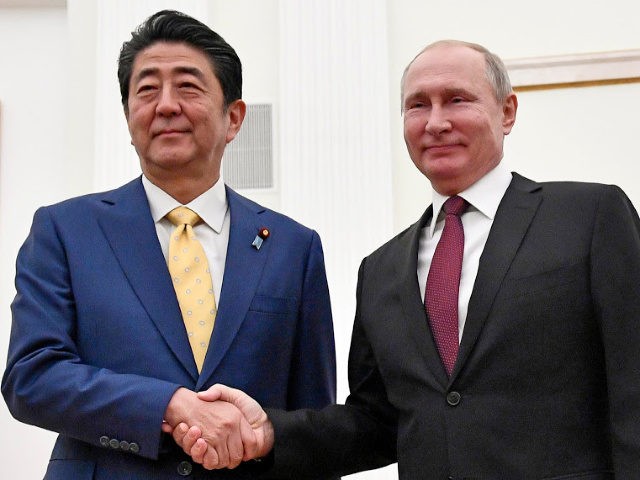Russian leader Vladimir Putin and Japanese Prime Minister Shinzo Abe held a summit Tuesday where they both affirmed their commitment to signing a peace treaty over their decades-long territorial dispute over the Russian-controlled Kuril Islands.
Russia and Japan have not been able to sign a peace treaty since Russia seized the islands at the end of World War II, so the countries remain technically at war.
Speaking at a joint news conference, Abe said that the Japanese and Russian foreign ministers would meet in February to continue negotiations over the dispute. Both sides are aiming to reach a deal by the Group of 20 summit in Osaka in June.
A deal that leads to a peace treaty between the two countries would end the last technically active conflict of that war.
At the end of the war, Soviet forces had seized the Kuril Islands, three main islands and a cluster of islets, expelling the thousands of Japanese living there and establishing their own military presence.
The sovereignty of the islands has been disputed ever since, souring relations between the two nations. Moscow has long argued that Japan renounced all claims when it signed its peace treaty with Allied forces. Tokyo, meanwhile, points to the fact that Russia never actually signed the treaty and argues that the islands were illegally captured and remain part of Japanese territory.
Previous proposals by Moscow have included handing over the islets nearest to Japan as well as offering joint control of economic activity over the islands, both of which have been rejected. One of Russia’s main reasons for not ceding any further territory is its use of the islands as a military base, which it likewise fears may be used in a similar way by hostile forces, including the United States, should Japan be in control.
The islands are also understood to have strong economic potential, with large reserves of oil, natural gas, and valuable minerals, as well as a strong fishing industry and growing levels of tourism.
Last week, the Japanese Foreign Ministry formally protested Russia’s detention of two Japanese boats that were caught fishing near the contested islands, describing the move as “unacceptable.”
Russian Foreign Minister Sergey Lavrov recently indicated that the price of any peace treaty would be the “indisputable recognition of the entirety of results of World War II, including Russia’s sovereignty over all of the islands of the southern Kuril chain.”
“This is our base position and without steps in this direction it is very difficult to expect movement forward on other issues,” he continued. “Sovereignty over the islands is not up for discussion. This is Russian territory … Why is Japan the only country in the world that cannot accept the results of World War II in their entirety?”
Follow Ben Kew on Facebook, Twitter at @ben_kew, or email him at bkew@breitbart.com.

COMMENTS
Please let us know if you're having issues with commenting.